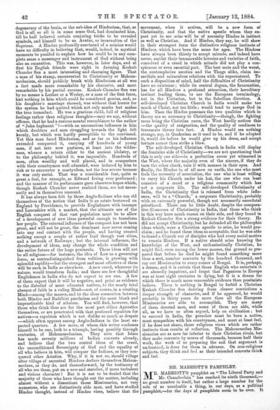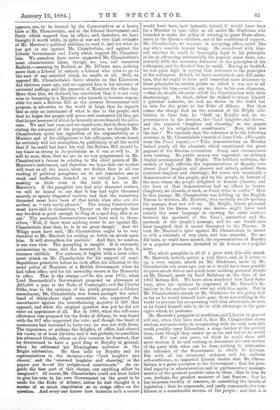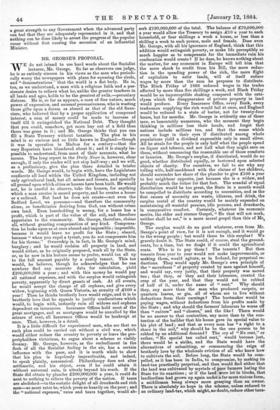MR. MARRIOTT'S PAMPHLET.
MR. MARRIOTT'S pamphlet on " The Liberal Party and Mr. Chamberlain " has reached its ninth thousand,— no great number in itself, but rather a large number for the sale of so unsaleable a thing, in our days, as a political pamphlet,—for the days of pamphlets seem to be over. It
appears, too, to be treated by the Conservatives as a heavy blow at Mr. Chamberlain, and at the Liberal Government and Party which support him in office ; and, therefore, we have thought it worth while, in spite of our not very high estimate of Mr. Marriott's political abilities, to read it, and see what he has got to say against Mr. Chamberlain, and against the Liberal Government and Party which support Mr. Chamber- lain. We ourselves have never supported Mr. Chamberlain's most characteristic ideas, though we, too, call ourselves Radical,—meaning by Radical, as Mr. Dillwyn says, nothing more than a Liberal in earnest, a Liberal who tries to go to the root of any mischief whicji he assails at all. Still, we opposed Mr. Chamberlain's fierce attacks on the Education Act thirteen years ago, and we opposed him in his advocacy of universal suffrage and the payment of Members the other day. More than this, we declared our conviction that it is not very wise or becoming in a Minister who intends to become respon- sible for such a Reform Bill as the present Government will propose, to advertise to the world at large that he regards this as only an instalment of what is due to the people, and that he hopes the people will never rest contented till they get that larger measure of which he honestly avows himself the advo- cate. We said last year, and we repeat now, that in thus depre- ciating the adequacy of the proposed reform, we thought Mr. Chamberlain quite too regardless of his responsibility as a Minister and of his obligations to his colleagues, whose hands he certainly will not strengthen, by publishing to all the world that if he could but have his way, the Reform Bill should be ten times as strong in its provisions as it can or will be. It will be seen, then, that we are in no way prepossessed in Mr. Chamberlain's favour in relation to the chief points of Mr. Marriott's indictment, and therefore we hope that our readers Will trust us all the more, when we declare that in all our reading of political pamphlets we do not remember one so weak and ineffective, founded on so trivial a basis, and making so little even of the basis it has, as Mr. Marriott's. If the pamphlet has had nine thousand readers, we will be bound to say that it has had eight thousand secretly or openly disgusted readers, and that the remaining thousand must have been of that feeble class who are de- scribed as " very easily pleased." The strong Conservatives must have said to themselves, 'Except on the principle that any brickbat is good enough to fling at a mad dog, this is no use.' The moderate Conservatives must have said to them- selves, Well, if there were nothing worse to say against Mr. Chamberlain than that, he is in no great danger.' And the Whigs must have said, ' Mr. Chamberlain ought to be very thankful to Mr. Marriott for writing so feeble an attack upon him. It will strengthen his position.' And that, we confess, is our own view. The pamphlei is naught. It is extremely acrimonious in tone, and the moment it comes• to facts it becomes childish. For instance, it begins with a most vehe- ment attack on Mr. Chamberlain for his support of semi- Republican principles before he took office, his adhesion to the usual policy of Members of a British Government when he had taken office, and for his unworthy sneers at the Monarchy in office. This is -the charge :—" In the year 1877, when Lord Beaconsfield's Government proposed an allowance of £25,000 a year to the Duke of Connaught, and Sir Charles Dilke, true to the opinions of his youth, proposed a dilatory amendment, Mr. Chamberlain was found amongst the select band of thirty-three rigid economists who supported the amendment against the overwhelming majority of 320 that opposed, and when the original question was put he did not enter an appearance at all. But in 1881, when the self-same allowance was proposed for the Duke of Albany, he was found with the 387 who supported the vote; and though the band of economists had increased to forty-two, he was not with them. The experience, or perhaps the delights, of office, had altered his views, or at least his vote, and it was probably to conciliate his advanced friends, whom on this occasion he deserted, that he determined to have a good fling at Royalty in general, when he addressed his Birmingham audience at the Bright celebration. He then held up Royalty and its representatives to the derision—the ' loud laughter and cheers,' and the ' renewed laughter and cheering,' as the papers put it—of his enlightened constituents." As re- gards the first part of this charge, can anything sillier be imagined 9 Of course, Mr. Chamberlain could not have failed to give his vote to his own Government on the grant to be made for the Duke of Albany, unless he had thought it a matter' of so much importance as to resign office on the question. And every one knows how imbecile such a course
would have been, how imbecile, indeed, it would have been for a Minister to take office at all under Mr. Gladstone who intended to make the policy of refusing to grant State allow- ances to the Queen's children, one of his conditions of support. Mr. Chamberlain, we suppose, in accepting office, acted like any other sensible human being. He considered with him- self whether he could be thoroughly loyal to his principles so far as advancing substantially the popular cause went, con- sistently with the necessary deference to the principles of his colleagues, and he decided that he could. Having so decided, he was quite right in paying that deference to the principles of his colleagues. Indeed, we have maintained, and still main- tain, that he ought to have paid somewhat more deference to these principles on certain points on which it was not at all necessary for him,—not in any way due to his own character, —that he should advertise afresh his dissatisfaction with their shortcomings. In short, unless he wished to stamp himself a political imbecile, he had no choice in the world but to vote for the grant to the Duke of Albany. But then comes the charge that on the occasion of the Bright cele- bration in June last, he "held up Royalty and its re- presentatives to the derision, the ' loud laughter and cheers,' and the renewed laughter and cheering,' as the papers put it, of his enlightened constituents." Now, what was the fact ? We conclude that the reference is to the following sentence in Mr. Chamberlain's speech of June 13th. (We quote from the Times' report) :—" Your demonstration on Monday lacked nearly all the elements which constituted the great pageant of the Russian coronation. Pomp and circumstance were wanting. No public money was expended ; no military display accompanied Mr. Bright. The brilliant uniforms, the crowds of high officials, the representatives of Royalty were absent (loud laughter and cheers), and nobody missed them (renewed laughter and cheering); for yours was essentially a demonstration of the people, and by the people, in honour of the man whom the people delighted to honour (cheers), and the hero of that demonstration had no offices to bestow (laughter), no ribands, or rank, or Court titles to confer." How in that passage Mr. Chamberlain was holding up the English Throne to derision, Mr. Marriott, who carefully avoids quoting the passage, does not tell us. Mr. Bright, whose profound respect for the Queen every one knows, might have used exactly the same language in drawing the same contrast between the spectacle of the Czar's coronation and the spectacle of the people's homage, and no one would ever have imagined that it meant disrespect to the Throne. It took Mr. Marriott's spite against Mr. Chamberlain to invent so silly a rationale of very plain and true remarks. No one did miss, or could have missed, the representatives of Royalty in a popular procession intended to do honour to a popular hero.
The whole pamphlet is all of a piece with this silly attack. Mr. Marriott, indeed, quotes a very fierce, and, as it seems to us, a very unjust, attack on Mr. Gladstone, made by Mr. Chamberlain ten years ago, just as it would have been possible to quote much fiercer and much more scathing personal attacks on Mr. Disraeli, made by Lord Salisbury at the time of the 1867 Reform Bill. We have often wondered how Lord Salis- bury, after the opinions he expressed of Mr. Disraeli's be- haviour in the matter, could ever act with him again. But in Mr. Chamberlain's attack on Mr. Gladstone for not going half as far as he would himself have gone, there was nothing in the world to prevent his co-operating with him afterwards, so soon as he found himself able to do so with advantage to the prin- ciples which he professes. Mr. Marriott's pamphlet is worthless, and Liberals in general will say, when they have read it, that Mr. Chamberlain shows wisdom, not insincerity, in co-operating with the only men who could possibly carry Liberalism a stage further at the present time, even though they cannot go so far and fast as he would wish. For our own parts, we think he would show still more wisdom if he said nothing to discontent his own section of the party with what can be done, nothing to undermine the influence of the Government to which he belongs. But with all his occasional rashness and his uniform self-confidence, no impartial Liberal doubts that Mr. Cham- berlain is a great accession to the Government ; that his prac- tical sagacity in administration and in parliamentary manage- ment is of the greatest possible value to them ; that to him we owe, perhaps, the greatest measure of last Session ; that he has immense fertility of resource, in conceiving the details of legislation ; that he commands, and justly commands, the con- fidence of a considerable section of the people ; and that it is a great strength to any Government when the advanced party can feel that they are adequately represented in it, and that nothing can be done likely to arrest the progress of the popular cause without first causing the secession of an influential Minister.








































 Previous page
Previous page